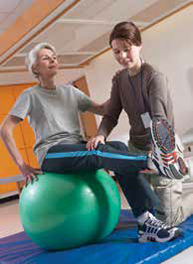
Feeling off-balance can put your world into a tailspin—literally and figuratively. Balance disorders have a long list of causes: inner-ear problems, cognitive or spinal cord injuries, muscle weakness or damage, diabetes, Parkinson disease and even simple aging. Regardless of the cause, balance disorders can put people at high risk for falls and disrupt daily activities due to fear of provoking symptoms.
Physical therapy can effectively treat balance disorders, but sometimes patients find the methods we use a bit disconcerting. These may include forcing you to lose your balance or making you perform exercises that exacerbate your dizziness or vertigo. However, there is a method to our apparent madness.
Your body’s balance depends on an intricate working relationship between your central nervous system and your inner ear, eyes, muscles and sense of body position, called proprioception. When even one of these begins to work improperly, major problems can occur.
Luckily, your brain can adapt to changes through a process called vestibular compensation. This doesn’t always happen easily, however, and that’s where physical therapy comes in: Through vestibular rehabilitation therapy, we can help encourage this compensation. The best way to do this is by performing exercises that provoke your symptoms of imbalance, allowing your brain to experience error and figure out how to correct it.
At the same time, we can address any postural problems or muscle weakness that could contribute to your poor balance. We will develop a plan that takes into consideration your individual needs and challenges, and ensure that the exercises are performed in a safe environment.
While vestibular rehabilitation therapy may take you out of your comfort zone at first, this is exactly what it is supposed to do—challenge your brain and body to figure out a new way of keeping you stable. We are here to guide you through the process, which should result in a better, balanced you.
